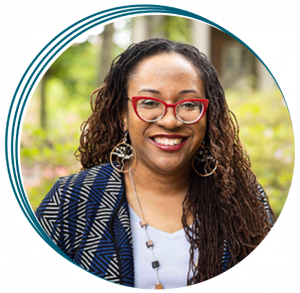Monday,
October 11
Tutorial
Learn strategies and abductive methods for key challenges in the synthesis stage of research and design projects.
*Pre-registration required
Tutorial
An end-to-end approach to scoping, planing, shooting, editing and sharing video ethnography projects.
*Pre-registration required
Tutorials
Learn tools and strategies for integrating people with disabilities into your research and driving inclusive design.
*Pre-registration required
Learn to identify “quantitative bias” so you can practice and communicate about qualitative research according to its unique value.
*Pre-registration required
Learn how to design ethnofutures projects and expand the time horizons of your work.
*Pre-registration required
More Info
Meet & Greet with EPIC Board & Staff
Tuesday,
October 12
Tutorial
Learn how to create and execute a recruitment plan, strategies for recruiting quality respondents, practices for engaging and motivating participants, and more.
*Pre-registration required
Tutorials
In this tutorial leaders and managers will develop care strategies and plans of action for supporting their teams, their people, and themselves.
*Pre-registration required
This tutorial gives you robust, actionable tools for navigating inequity through a project life cycle.
*Pre-registration required
Tutorials
Learn how to put sustainability principles into research practice and make the case for sustainability with stakeholders, clients, and organizations.
*Pre-registration required
Instructors: Julia Haines (Senior User Experience Researcher, Google) & Bob Evans (Senior Software Engineer, Google)
Learn to open-source research platform using sensors and logs, surveys, experience sampling, triggers, and prompts.
*Pre-registration required
Learn strategies for designing practical research of inaccessible or future environments.
*Pre-registration required
Wednesday,
October 13
Sponsored Panel
Presented by Waymo
![]()

Panelists:
Megan Neese, Research Manager, Insights Team
Benedikt Fisher, Insights Researcher, Trucking
Melissa Cefkin, Insights Researcher & Lead, Driving Behavior and Tertiary Communications
How do we anticipate the futures of the things we are bringing into the world, and the experiences they will help shape? The autonomous vehicle is posited as a net-new innovation. Never before have vehicles without human drivers at the helm roamed the same streets that we traverse daily while on a jog or in a bleary-eyed morning search for a cuppa-joe. Someday soon(ish) you may hail a fully autonomous ride for a trip to the office or for the once-in-a-lifetime race to the hospital for the birth of a first born. What a fantastically new product and world this will be! Or will it? How much are innovators tweaking and updating the existing, instead of inventing the new? Join us for a conversation between members of the Waymo Insights team and invited panelists to explore “how new is the new?” Following decades of imagination, development, and narratives of hope and futures, the autonomous vehicle presents the future product/concept par excellence for this conversation amongst social and human-centered researchers and designers! The Waymo Insights team is dedicated to critical, yet engaged thinking about the emergence of new technologies in general, and autonomous vehicles and the future of mobility in particular.
Networking
 Jump into EPIC2021 with a set of new connections to build on. A round-robin of fun, bite-sized moments offers just enough structure to spark relationships across the EPIC community.
Jump into EPIC2021 with a set of new connections to build on. A round-robin of fun, bite-sized moments offers just enough structure to spark relationships across the EPIC community.
Thanks to dscout for supporting this session.
Learn about EPIC2021 sponsors.
Sponsored Panel
Presented by Atlassian
![]()

Panelists:
Leisa Reichelt, Head of Research & Service Experience, Atlassian
Caitlin McCurrie, Lead Researcher, Atlassian
Cara Maritz, Researcher, Atlassian
Jake Moody, Research Senior Team Lead, Atlassian
Adam Wride, General Manager of Planning Solutions, GitKraken
With nearly 6,000 Atlassians, achieving customer-centricity that’s meaningful, sustainable, and respectful of people’s attention can be a challenge. Standard approaches and tools can overwhelm populations and lead to “Feedback Fatigue,” particularly in small populations of users. To solve this, we’ve made opportunistic use of the tools and mechanisms for engagement that we have immediately around us: we use Confluence for diary studies, Jira Service Management as an intercept, and we triangulate with feedback captured by our customer-facing collaborators.
In this panel, moderated by Head of Research & Service Experience, Leisa Reichelt, Atlassian researchers and a member of our customer community will discuss how iterating our methods and ways of working helped our product teams achieve customer-centricity without our customers feeling the toll of “feedback fatigue.” We’re looking forward to a lively conversation with our panelists and attendees about the relationships we want to build and process for gathering insights as we co-create the future.
Sponsored Panel
Presented by Facebook
![]()
Panelists:
Jay Hasbrouck (moderator), Pathfinder—New Product Experimentation, Facebook
Heather Patterson, Responsible Innovation Manager, Facebook
Jamie Kimmel, Researcher, Instagram Labs
Pathfinders, foresight strategists, and responsible innovation researchers help Facebook understand how cultures and communities evolve so our teams can create products that meet future needs. They think beyond the current moment to provide insight that minimizes potential risk to people, societies, and environments and help build toward promising opportunities. Although these researchers come from different backgrounds, they all share characteristics that are quite familiar to ethnographers: a propensity to think holistically, an appreciation of evolutionary patterns, and the ability to situate insights within large, complex systems across time horizons. Attendees will learn how pathfinders, foresight strategists, and responsible innovation researchers apply these qualities to their work at Facebook, as well as how attendees might apply similar future thinking and strategic approaches to their own work.
Thursday,
October 14
Tutorials
Develop a strategy for cultivating a successful research team and and growing yourself as a leader.
*Pre-registration required
Learn the core vocabulary, concepts, and methods of project managers, risk managers, and quality assurance managers, and explore how they align with ethnographic practices and expertise.
*Pre-registration required
Learn how to design ethnofutures projects and expand the time horizons of your work.
*Pre-registration required
More Info
Networking
 Everyone has something to learn and something to offer. Share and receive wisdom of all sorts in this fun session designed to foster connection and reciprocity.
Everyone has something to learn and something to offer. Share and receive wisdom of all sorts in this fun session designed to foster connection and reciprocity.
Thanks to Gemic for supporting this session.
Learn about EPIC2021 sponsors.
Networking

As we “skill up” in tutorials this week, this fun networking session focuses on sharing stories as different kind of professional development. Doing ethnography requires intention, rigor, resilience, improvisation, creativity, and straight-up serendipity. We’ll share some of the triumphant, humbling, and humorous moments that shape our professional journeys as much as formal skills.
Thanks to Verizon for supporting this session.
Learn about EPIC2021 sponsors.
Tutorial
An end-to-end approach to scoping, planing, shooting, editing and sharing video ethnography projects.
*Pre-registration required
Friday,
October 15
Networking

Co-create themes and threads to discuss during the conference, and connect to people who want to have those conversations with you.
Thanks to Spotify for supporting this session.
Learn about EPIC2021 sponsors.
Tutorial
Learn concepts and mindsets of business culture to make your work more intelligible and influential.
*Pre-registration required
Meet & Greet with EPIC Board & Staff
Monday,
October 18

EPIC2021 Co-chairs Jan English-Lueck, Sam Ladner, and Jamie Sherman launch the main program! Dig into key themes that will unfold over the next three days and meet up with attendees from North and South America, Europe, Africa, and South and West Asia.

EPIC2021 Co-chairs Jan English-Lueck, Sam Ladner, and Jamie Sherman launch the main program! Dig into key themes that will unfold over the next three days and meet up with attendees from North and South America and Asia Pacific.
Tuesday,
October 19
Keynote: Panthea Lee
 Panthea Lee is a strategist, organizer, designer, and facilitator, and the Executive Director of Reboot. She is a pioneer in designing and guiding multi-stakeholder processes to address complex social challenges, with experience in 30+ countries with partners including UNDP, MacArthur Foundation, Luminate, CIVICUS, Wikimedia, Women’s Refugee Commission, and governments and civil society groups. Panthea began her career as a journalist, ethnographer, and cultural producer. She has been featured in Al Jazeera, The Atlantic, CNN, Fast Company, New York Times, MIT Innovation, and Stanford Social Innovation Review, and serves on the boards of The Laundromat Project, RSA US, Development Gateway, and People Powered: The Global Hub for Participatory Democracy.
Panthea Lee is a strategist, organizer, designer, and facilitator, and the Executive Director of Reboot. She is a pioneer in designing and guiding multi-stakeholder processes to address complex social challenges, with experience in 30+ countries with partners including UNDP, MacArthur Foundation, Luminate, CIVICUS, Wikimedia, Women’s Refugee Commission, and governments and civil society groups. Panthea began her career as a journalist, ethnographer, and cultural producer. She has been featured in Al Jazeera, The Atlantic, CNN, Fast Company, New York Times, MIT Innovation, and Stanford Social Innovation Review, and serves on the boards of The Laundromat Project, RSA US, Development Gateway, and People Powered: The Global Hub for Participatory Democracy.
Panel

Jillian Powers, Moderator (Responsible AI Lead, Cognizant)
Jordan Kraemer (Director, Policy & Research, Center for Technology & Society, Anti-Defamation League)
Arwa Michelle Mboya (Spatial Computing Product Designer, Magic Leap)
Jessica Outlaw (Research Director, The Extended Mind)
Immersive technologies create novel experiences of embodiment and reality, not to mention new sources of personal data. These facets create distinctive challenges for ethics, equity, and inclusion, intensifying the potential harms of misinformation, harassment, privacy violations, surveillance, or unequal access. How can researchers and designers develop an anticipatory vision for ethical VR/AR research and development? This panel brings together academic and industry voices to discuss frameworks for ethical tech, inclusion and accessibility in VR/AR, new research strategies for designing ethical VR/AR, and how to advocate for people-centered VR/AR applications across product design and research teams.
Papers Session
How do we innovate for the future without understanding the past? How do we simultaneously prevent the past from locking us into just reproducing what we’ve already experienced? The papers in this session span theory to practice, all in service of unleashing a better unknown, but through the structure of controlled methods.
Searching for the Next Billion
Jennifer Zamora, Google
Leveraging Speculative Design to Re-imagine Product Roadmaps
Sanya Attari, Facebook
Charley Scull, Facebook
Mahboobeh Harandi, Syracuse University
Anticipating Headwinds: Using Cultural Tacking and Narrative Navigation to Build an Inclusive Future
Kate Sieck
PechaKucha Session
 What does it mean to use creative methods in our research? From which techniques and toolboxes do we begin, if we want to anticipate the toolbox for our future practice? How can we incorporate alternative methods, paying attention to feelings as well as facts? In this panel, authors become bricoleurs who put their assumptions about knowledge creation on hold in order to explore a range of unexpected sources.
What does it mean to use creative methods in our research? From which techniques and toolboxes do we begin, if we want to anticipate the toolbox for our future practice? How can we incorporate alternative methods, paying attention to feelings as well as facts? In this panel, authors become bricoleurs who put their assumptions about knowledge creation on hold in order to explore a range of unexpected sources.
Our Advocacy Practice for Their Change
Amanda Rosenberg, Workday
Intuition: Thinking through Loopholes
Laura Reiss, Independent
Reconfiguring Home: Seeing Remote Work and School through Mothers and Their Children
Chloe Chang & Vinay Kumar Mysore
Case Studies Session
COVID-19 was a catalyst for rethinking the future of workers and public service providers. Across countries and contexts, researchers needed to understand the changing landscape of labor. These case studies demonstrate how researchers have anticipated new worker realities.
Anticipating Needs: How Trauma-Informed Research During COVID-19 Changed Our Everyday Work
Meredith Hitchcock, Airbnb
Sadhika Johnson, Airbnb
Human Skills as Essential Skills: Preparing Low-Skilled Job Seekers for Inclusion in the Future Economy
Minnar Xie, Blueprint
Ebony Bertorelli, Blueprint
Reconnecting with the Public
Lok Yi Lee, Brandnographer
Lyra Jiang, Brandnographer
Networking
Hosts:
Nelle Steele, Nelle Steele Research
Bec Purser, Senior Manager of Service Design, Transport for NSW
Wednesday,
October 20
Case Studies Session
Ethnographers must use insights about the consumers of current products and services in order to anticipate future ones. In this session, researchers demonstrate how they do this such diverse contexts as immersive media, virtual primary care, and future vehicles.
Building for the Future, Together: A Model for Bringing Emerging Products to Market, Using Anticipatory Ethnography and Mixed Methods Research
Stefanie Hutka, Adobe, Inc.
Anticipating the Arrival of a Clean-Sensitive Driving Future
Annicka Campbell-Dollaghan, Rightpoint Consulting
Omer Tsimhoni General Motors
Edward Gundlach, General Motors
Camille Sharrow-Blaum, Rightpoint Consulting
Ashlynn Denny, Rightpoint Consulting
Designing Virtual Primary Health Care
Marie Mika, Grand Rounds, Inc.
Arvind Venkataramani, Sonic Rim
Networking
Host: Lyn Jeffery, Director, Institute for the Future Foresight Essentials
PechaKucha Session
 These presentations call on us to think beyond the human-centered approaches that are now so well-received and much-loved. They offer alternative lenses on the whole environment—of which human are just a part—at a time when so much of the world is at stake.
These presentations call on us to think beyond the human-centered approaches that are now so well-received and much-loved. They offer alternative lenses on the whole environment—of which human are just a part—at a time when so much of the world is at stake.
Microbes that Matter
Carrie Yury, Fjord
On Being Well in a Time of Hell
Chloe Evans, Spotify
Mira Shah, Spotify
Camie Steinhoff, Spotify
Hands Are People Too: Reflections on the Value of Hands (and How to Study Them) from Ethnographic Research to Inform the Development of Haptic Technology
Maria Cury, RED Associate
Kahyun Sophie Kim, Facebook Reality Labs
Psychology: The Ballast in Anthropology’s Ship
Ben Doepke, IX
Papers Session
A digitally connected world ostensibly signifies “progress” and “betterment”—but for whom exactly, and in what ways? In this session, we consider how ideas that lead to progress can be better situated within communities, and how anthropology supports communities that originate ideas to continue to be stewards, even within the context of the instantaneous and digital sharing.
Weaving Textile Futures: Indigenous Resistance and Intellectual Property
Amapola Rangel Flores, University of the Americas Puebla
Cities as Anticipatory Systems: Analyzing “Weak Signals” to Explore beyond the Predictability of Their Future
Nora Morales, UAM Cuajimalpa
Salomon Gonzalez, UAM Cuajimalpa
Keynote: Ebony Elizabeth Thomas

Ebony Elizabeth Thomas is Associate Professor in the Literacy, Culture, and International Education Division at the University of Pennsylvania’s Graduate School of Education. She studies how people of color are portrayed—or not—in children’s and young adult literature, and how those portrayals shape our culture. As this literature continues to dominate publishing and Hollywood, she strongly believes that the field can become one of the most effective postcolonial, critical, and activist projects of all. Professor Thomas has been interviewed about her work in international media, including MSNBC, the BBC, the New York Times, the Philadelphia Inquirer, and the Chicago Tribune.
Panel

Marc LaFleur, Moderator (Partner, Human Centered Design, Cognizant)
Devon Powers (Associate Professor, Department of Advertising and Public Relations, Temple University
Jacques Barcia (Research Fellow, Institute for the Future)
Jorge Camacho (Co-Founder, Diagonal)
Jennifer Lee Fuqua (Experience Design Director, Ogilvy)
Events of the 18 months have upended questions of the future and, for business, cast a new light on how it might better contemplate and plan for uncertainties. Covid has also opened up a new sense of potential when it comes to re-inventing or designing better or new futures for ourselves, providing a sense of agency and fluidity that had, until recently, seemed less tangible. This panel will engage in this dialogue with the future, particularly as it relates to the future of business and the ways in which business could contemplate, confront and shape the future.
Thursday,
October 21
PechaKucha Session
 The PechaKuchas in this session go beyond peering into our futures—they unsettle long-standing truisms about what it means to be human, as bodies and beings in space and time. Presenters offer new and even experimental approaches to understanding what a future might look like when we reimagine bodies and senses.
The PechaKuchas in this session go beyond peering into our futures—they unsettle long-standing truisms about what it means to be human, as bodies and beings in space and time. Presenters offer new and even experimental approaches to understanding what a future might look like when we reimagine bodies and senses.
Do Not Fear Mistakes
Katherine Metzo, Lowes
Ethnographic Fiction: Exploring Bio-technological Possibilities through a Retrospeculative Lens
Oshin Siao Bhatt, Design Academy Eindhoven
Holidays and the Anticipation of Ritual
Rob Murray, IBM
Panel

Nadine Levin, Moderator (Senior UX Researcher, San Francisco Digital Services)
Zahra Ebrahim (CEO, Monumental)
Mithula Naik (Head of Design Research, Canadian Digital Service, Government of Canada)
Morgan G. Ames (Associate Director of Research, Center for Science, Technology, Medicine and Society, University of California, Berkeley
In the past two years, enormous and increasing inequality has been matched with a decreasing level of faith in public programs and institutions to provide quality health care and education—or even fair access elections. Systems designed for public good are often siloed and ineffective; policy and regulations affecting social safety net benefits are in flux. Using the tools of data, design, activism, technology, and innovation, these panelists have led an ethnography forward approach to reimagine these systems and move toward safety nets that work for all.
Networking
Hosts:
Oleksiy Moskalenko, Head of Solutions Mapping, UNDP
Nelle Steele, Nelle Steele Research
Papers Session
Future visions are products of their locations. But what if those visions are crafted at the periphery and not at the centre? This session decenters visioning, to explore futures from those often silenced, and to highlight ways of doing this decentering.
Come to Your Senses: Ethnography of the Everyday Futuring
Rebekah Park, Gemic
Jana Jevtic, Gemic
Futures in Things: Locating the Promise of Infrastructures in Public Libraries
Sandjar Kozubaev, Georgia Institute of Technology
Carl DiSalvo, Georgia Institute of Technology
Keynote: Jason Lewis
 Jason Edward Lewis is University Research Chair in Computational Media and the Indigenous Future Imaginary and Professor of Computation Arts at Concordia University. His multidisciplinary research and creative practice has been central to developing Indigenous media art in North America and worldwide, establishing a vital conversation about the interaction between Indigenous culture and computational technology. His contributions comprise scholarly writing, art making and technology research, as well as his leadership of the Initiative for Indigenous Futures and his creation of the Indigenous Futures Research Centre. Lewis also spend a decade working in a range of industrial research settings, including Interval Research, US West’s Advanced Technology Group, and the Institute for Research on Learning, and the venture capital firm Arts Alliance.
Jason Edward Lewis is University Research Chair in Computational Media and the Indigenous Future Imaginary and Professor of Computation Arts at Concordia University. His multidisciplinary research and creative practice has been central to developing Indigenous media art in North America and worldwide, establishing a vital conversation about the interaction between Indigenous culture and computational technology. His contributions comprise scholarly writing, art making and technology research, as well as his leadership of the Initiative for Indigenous Futures and his creation of the Indigenous Futures Research Centre. Lewis also spend a decade working in a range of industrial research settings, including Interval Research, US West’s Advanced Technology Group, and the Institute for Research on Learning, and the venture capital firm Arts Alliance.
